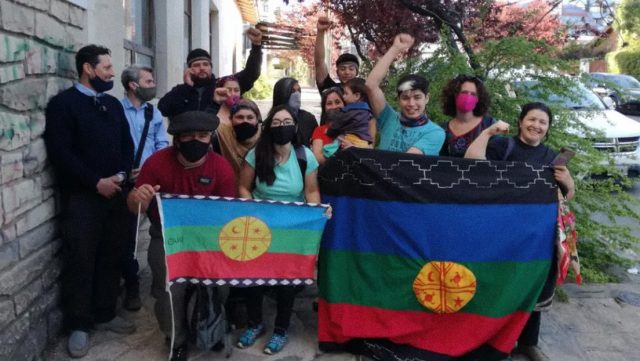The resolution became relevant for the Mapuche communities in Argentina because indigenous law and its importance were taken into account.
It is not common for the Argentine Justice to take the side of the weakest, but sometimes it happens. This November 24, the Che Buenuleo indigenous community achieved a historic ruling by the Rio Negro Province Court of Appeal – to which this media had access -, which dismissed criminal charges against the Mapuches who had been denounced after settling in an ancestral territory, in the Bariloche area.
Although the substantive issue of the territorial dispute has yet to be resolved, the magistrates were clear in pointing out that the crime of usurpation does not exist, and that the conflict should not be settled in the criminal justice system. That is, before criminalizing aboriginal actions, there are other instances, in administrative offices or in the civil jurisdiction, to resolve this type of controversy. It is a decision that could pacify the area, and set a precedent in the province, while other Mapuche organizations run the risk of being forcibly evicted in Argentina.
The resolution became relevant for the communities because indigenous law was taken into account, made up of local regulations and norms, but above all, international treaties. Of these, Convention 169 of the International Labor Organization (ILO) stands out, which mentions the «traditional occupation» of the territory. This is interpreted as the creation of land rights, the use of which determines the aboriginal lifestyle, and should be recognized beyond State authorization, explains journalist Leandro Lutzky in a report for RT.
«Indigenous communities have territorial rights, which in no way conflict with private property», say the judges. In effect, the Mapuches occupied the site according to their cultural bases, but never forcibly restricted its use to the private owner of the site. “The presence in that site of the members of the community is not due to the will to commit a crime, but rather to exercise a right. A right on which the State has not regulated or harmonized with other rights for a long time”, adds the sentence.
Attacks, threats and eviction attempts in Argentina
In September 2019, the community carried out «an act of reaffirmation of part of its territory of traditional occupation», says Matías Schraer, a lawyer for the Mapuches in Argentina. It is about 50 people who settled in a perimeter of 90 hectares, in a total territory of about 480. This affected the interests of Emilio Friedrich, who proclaims himself as the owner of the land.
The lawyer tells RT, that the community was threatened and intimidated «with firearms and knives» by an irregular group, which would respond to the private actor involved. Due to the incident, the Police arrived and the indigenous people were able to resist in the site, and even had to be guarded. Later, Friedrich filed a complaint, and the provincial justice automatically ordered an eviction. «Through various presentations and appeals, we had it suspended», says the lawyer.
Likewise, the case for alleged usurpation remained open, a crime that can be punished with up to three years in prison. And although the recent ruling can still be appealed to the provincial court, the fact that the highest criminal court has agreed with the aborigines, has given the community a good dose of enthusiasm, after two years of litigation.
«They said that the Lof (Mapuche family clan) had entered a place that did not belong to them, using violent means. This was never the case and they could not prove it, because the community held a ceremony in that territory that is in conflict, in broad daylight, entering through the public access roads», remarks Schraer.
«No one can usurp what belongs to them»
«To possess is to have a thing. The private (actor) said that they had the ‘thing’. But we argued that the community held the traditional occupation, a distinct, indigenous possession. It means that the material element could have been lost, but the link between the community and its territory was never broken, it was always in force. That is the transcendental aspect of this sentence“, explains the interviewee. «No one can usurp what belongs to them», he emphasizes.
For the lawyer, from now on, the lower magistrates in Argentina should «take note» to apply aboriginal law. On this, he emphasizes: «Indigenous people have a lot of rights, but they are not effectively exercised. Many times, the judges do not apply them due to ignorance, and on other times, because they have strong interests (in play)”.
In addition, indigenous organizations are often at a disadvantage in court. Schraer believes that criminal justice, for a long time now, generally tends to restore the property to the private actor who holds possession in Río Negro. «It is a problem for the communities, because they have to demonstrate ancestral possession, and it is necessary to resort to anthropological studies and other issues that cannot be resolved overnight», points out Schraer.
Meanwhile, other aboriginal groups in the Argentine province are in suspense, waiting to endure a possible expulsion at the hands of the security forces. «I am aware of three other communities with eviction orders», reports the defender. And he concludes: «I want this ruling to have an impact on them too and the lawyers can use it to avoid the criminalization of these territorial reaffirmations».


